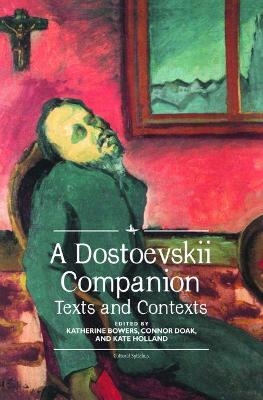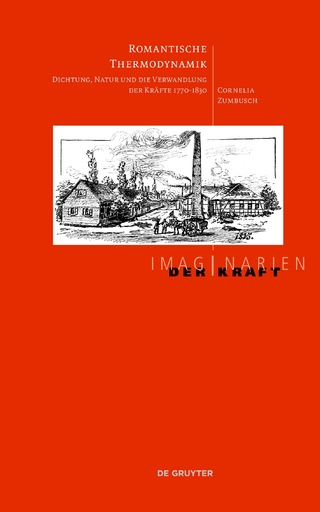
A Dostoevskii Companion
Academic Studies Press (Verlag)
978-1-61811-727-4 (ISBN)
The powerful, impassioned, and often frenetic prose of Fedor Dostoevsky continues to fascinate readers in the twenty-first century, even though we are far removed from Dostoevsky’s Russia. A Dostoevsky Companion: Texts and Contexts aims to help students and readers navigate the writer’s fiction and his world, to better understand the cultural and sociopolitical milieu in which Dostoevsky lived and wrote. Rather than offer a single definitive view of the author, the book contains a collection of documents from Dostoevsky’s own time (excerpts from his letters, his journalism, and what his contemporaries wrote about him), as well as extracts from the major critical studies of Dostoevsky from the contemporary academy. The volume equips readers with a deeper understanding of Dostoevsky’s world and his writing, offering new paths and directions for interpreting his writing.
Katherine Bowers is an Assistant Professor of Slavic Studies at the University of British Columbia. A specialist in nineteenth-century Russian literature and culture, she is currently completing a monograph about gothic fiction’s influence on Russian realism. Connor Doak is a lecturer in Russian at the University of Bristol. He works primarily on nineteenth- and twentieth-century Russian literature, with a special interest in gender and sexuality in Russian culture. He has authored articles on authors including Dostoevsky, Chekhov, Petrushevskaia and Pushkin, and is currently working on a study of masculinity in Maiakovsky’s poetry. Kate Holland is Associate Professor of Russian Literature at the University of Toronto. She is the author of the monograph, The Novel in the Age of Disintegration: Dostoevsky and the Problem of Genre in the 1870s (2013), as well as articles on Dostoevsky, Tolstoy, Herzen, Saltykov-Shchedrin and Veselovsky.
Acknowledgments
How to Use this Book
Note on Translation, Transliteration, and Referencing
Timeline of Dostoevsky’s Life and Works
Biography and Context
Chapter 1: The Early Dostoevsky
Introduction
“A Noble Vocation” (2012) by Robert Bird
The Ribbon Theft Incident from Confessions(1789) by Jean-Jacques Rousseau
A Son’s Revenge from The Robbers(1781) by Friedrich Schiller
First Glimpse of Udolpho (1794) by Ann Radcliffe
The House of Monsieur Grandet in Eugénie Grandet(1833) by Honoré de Balzac
Little Nell in The Old Curiosity Shop(1841) by Charles Dickens
The Overcoat (1842) by Nikolai Gogol′
Poor Folk(1846) by Fedor Dostoevsky
First Night from “White Nights” (1848) by Fedor Dostoevsky
Letter to Gogol′ (1847) by Vissarion Belinskii
Three Documents from the Petrashevskii Trial (1849)
The Mock Execution: Letter to Mikhail Dostoevsky, December 22, 1849 by Fedor Dostoevsky
Chapter 2: Dostoevsky and His Contemporaries
Introduction
A Review of The Double(1846) by Vissarion Belinskii
Thoughts on The Double(1847) by Valerian Maikov
The Row with Turgenev: Letter to Apollon Maikov, August 16, 1867 by Fedor Dostoevsky
The Caricature of Turgenev in Demons(1872) by Fedor Dostoevsky
Reaction to Demons: Letter to Mariia Miliutina, December 3, 1872 by Ivan Turgenev
“Landowners’ Literature”: Letter to Nikolai Strakhov, May 18, 1871 by Fedor Dostoevsky
Thoughts on Anna Karenina(1877) by Fedor Dostoevsky
Tiny Alterations of Consciousness (1890) by Lev Tolstoy
From A Cruel Talent(1882) by Nikolai Mikhailovskii
Tolstoy and Dostoevsky (1902) by Dmitrii Merezhkovskii
The Root and the Flower: Dostoevsky and Turgenev (1993) by Robert Louis Jackson
Poetics
Chapter 3: Aesthetics
Introduction
Mr—bov and the Question of Art (1861) by Fedor Dostoevsky
The Defense of the Ideal: Letter to Apollon Maikov, December 11, 1868 by Fedor Dostoevsky
Apropos of the Exhibition (1873) by Fedor Dostoevsky
Poet of the Underground (1875) by Fedor Dostoevsky
Dmitrii Karamazov on Beauty (1878) by Fedor Dostoevsky
Two Kinds of Beauty (1966) by Robert Louis Jackson
Dostoevsky’s Fantastic Pages (2006) by Vladimir Zakharov
Chapter 4: Characters
Introduction
Makar Devushkin (2009) by Carol Apollonio
Underground Man (1963) by Mikhail Bakhtin
Raskol′nikov (2002) by Konstantine Klioutchkine
Myshkin (1998) by Liza Knapp
Nastas′ia Filippovna (2004) by Sarah J Young
Stavrogin (1969) by Joseph Frank
Fedor Karamazov (2003) by Deborah A Martinsen
Ivan Karamazov and Smerdiakov (1992) by Harriet Murav
Alesha Karamazov (1977) by Valentina Vetlovskaia
Chapter 5: The Novel
Introduction
A Novel of Disintegration from the Notebooks for The Adolescent(1874) by Fedor Dostoevsky
An Exceptional Family from The Adolescent(1875) by Fedor Dostoevsky
Remaking the Noble Family Novel (2013) by Kate Holland
A New Kind of Hero (1963) by Mikhail Bakhtin
“Chronicle Time” in Dostoevsky (1979) by Dmitrii Likhachev
The Narrator of The Idiot(1981) by Robin Feuer Miller
Sideshadowing in Dostoevsky’s Novels (1994) by Gary Saul Morson
The Plot of Crime and Punishment(2016) by Robert L Belknap
Chapter 6: From Journalism to Fiction
Introduction
Feuilleton, April 22, 1847 by Fedor Dostoevsky
The Petersburg Feuilletons (1979) by Joseph Frank
Dostoevsky’s “Vision on the Neva” (1979) by Joseph Frank
Excerpts from the Notebooks forThe Idiot(1867) by Fedor Dostoevsky
Nastas′ia Filippovna’s History from The Idiot(1869) by Fedor Dostoevsky
Ol′ga Umetskaia and The Idiot(2017) by Katherine Bowers
Two Suicides from A Writer’s Diary(1876) by Fedor Dostoevsky
From “The Meek One: A Fantastic Story” (1876) by Fedor Dostoevsky
A Case Study: October, November, December 1876 (2013) by Kate Holland
A Writer’s Diary as a Historical Phenomenon (2004) by Igor′ Volgin
A Writer’s Diary, April 1877 issue in full
Themes
Chapter 7: Captivity, Free Will, and Utopia
Introduction
Dostoevsky’s Prison Years (2013) by James P Scanlan
Prison Life: Letter to Mikhail Dostoevsky, February 22, 1854 by Fedor Dostoevsky
The Prison from Notes from the House of the Dead(1862) by Fedor Dostoevsky
The Eagle from Notes from the House of the Dead(1862) by Fedor Dostoevsky
Dostoevsky Responds to the Censorship Committee (1986) by Joseph Frank
Vera Pavlovna’s Fourth Dream from What Is to Be Done?(1863) by Nikolai Chernyshevskii
The Prison of Utopia (1986) by Joseph Frank
The Crystal Palace from Notes from Underground(1864) by Fedor Dostoevsky
Twice Two from Notes from Underground(1864) by Fedor Dostoevsky
Philosophical Pro et Contra in Part I of Crime and Punishment(1981) by Robert Louis Jackson
Meta-utopia (1981) by Gary Saul Morson
A Note on His Wife’s Death (1864) by Fedor Dostoevsky
The Speech at the Stone from Brothers Karamazov(1880) by Fedor Dostoevsky
Ode to Joy (2004) by Robert Louis Jackson
Chapter 8: Dostoevsky’s Others
Introduction
Portrait of Alei in Notes from the House of the Dead(1862) by Fedor Dostoevsky
Portrait of Isai Fomich inNotes from the House of the Dead(1862) by Fedor Dostoevsky
The Jewish Question (1877) by Fedor Dostoevsky
Christians, Muslims, and Jews in Notes from the House of the Dead(2008) by Susan McReynolds
From “A Few Words about George Sand” (1876) by Fedor Dostoevsky
From “About Women Again” (1876) by Fedor Dostoevsky
The Woman Question in Crime and Punishment(1994) by Nina Pelikan Straus
The Mothers Karamazov (2009) by Carol Apollonio
Chapter 9: Russia
Introduction
Fellow Convicts from Notes from the House of the Dead(1862) by Fedor Dostoevsky
After the Emancipation (1860) by Fedor Dostoevsky
Going Beyond Theory (1862) by Fedor Dostoevsky
Dostoevsky and the Slavophiles (2003) by Sarah Hudspith
The Coming Apocalypse from the Notebooks for Demons(1870) by Fedor Dostoevsky
Peasant Marei (1876) by Fedor Dostoevsky
Pushkin Speech (1880) by Fedor Dostoevsky
Chapter 10: God
Introduction
A Confession of Faith: Letter to Natal′ia Fonvizina, early March 1854 by Fedor Dostoevsky
Myshkin and Rogozhin Exchange Crosses in The Idiot(1869) by Fedor Dostoevsky
Dostoevsky’s Religious Thought (1903) by Lev Shestov
On the Grand Inquisitor (1921) by Nikolai Berdiaev
Hagiography in Brothers Karamazov(1985) by Nina Perlina
On the Koranic Motif in The Idiot and Demons(2012) by Diane Oenning Thompson
From Dostoevsky’s Religion(2005) by Steven Cassedy
Index
| Erscheinungsdatum | 31.10.2018 |
|---|---|
| Reihe/Serie | Cultural Syllabus |
| Zusatzinfo | Illustrations, unspecified |
| Verlagsort | Brighton |
| Sprache | englisch |
| Maße | 155 x 234 mm |
| Themenwelt | Geisteswissenschaften ► Sprach- / Literaturwissenschaft ► Anglistik / Amerikanistik |
| Geisteswissenschaften ► Sprach- / Literaturwissenschaft ► Literaturgeschichte | |
| Geisteswissenschaften ► Sprach- / Literaturwissenschaft ► Literaturwissenschaft | |
| ISBN-10 | 1-61811-727-0 / 1618117270 |
| ISBN-13 | 978-1-61811-727-4 / 9781618117274 |
| Zustand | Neuware |
| Haben Sie eine Frage zum Produkt? |
aus dem Bereich


